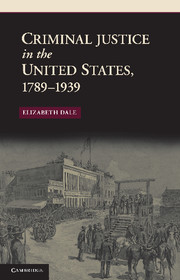Book contents
- Frontmatter
- Contents
- Introduction
- 1 criminal justice and the nation, 1789–1860
- 2 crime and justice in the states, 1789–1839
- 3 law versus justice in the states, 1840–1865
- 4 states and nation, 1860–1900
- 5 criminal justice, 1900–1936
- 6 rights and the turn to law, 1937–1939
- Conclusion
- Bibliographic Essay
- Index
- References
4 - states and nation, 1860–1900
Published online by Cambridge University Press: 05 June 2012
- Frontmatter
- Contents
- Introduction
- 1 criminal justice and the nation, 1789–1860
- 2 crime and justice in the states, 1789–1839
- 3 law versus justice in the states, 1840–1865
- 4 states and nation, 1860–1900
- 5 criminal justice, 1900–1936
- 6 rights and the turn to law, 1937–1939
- Conclusion
- Bibliographic Essay
- Index
- References
Summary
The changes in criminal law in the first half of the nineteenth century at best were gradual and incomplete; those that followed the end of the Civil War often were quicker, but still were limited. Shifts in the country’s social dynamics drove state governments to try to expand their powers, while pressure from reformers and the desire to circumvent the powers of popular justice prompted other efforts to strengthen state-level institutions of criminal justice. At the same time, the national government, which had expanded its power during the war and Reconstruction, tried to assume a greater role in criminal law. All those efforts to bring crime and criminal justice finally under government rule were countered once again by popular forces, from the rough justice of the lynch mob to the more subdued, but not less significant activities of law-and-order leagues. And those familiar attempts to maintain the sovereignty of the people were both complemented and thwarted by renewed attempts to appeal to rights. All this meant that the last decades of the nineteenth century were a period of great flux in criminal justice; yet when that century came to a close, the fundamental tension between formal law and popular justice remained.
- Type
- Chapter
- Information
- Criminal Justice in the United States, 1789–1939 , pp. 65 - 96Publisher: Cambridge University PressPrint publication year: 2011



